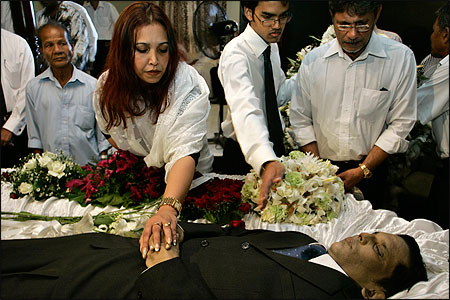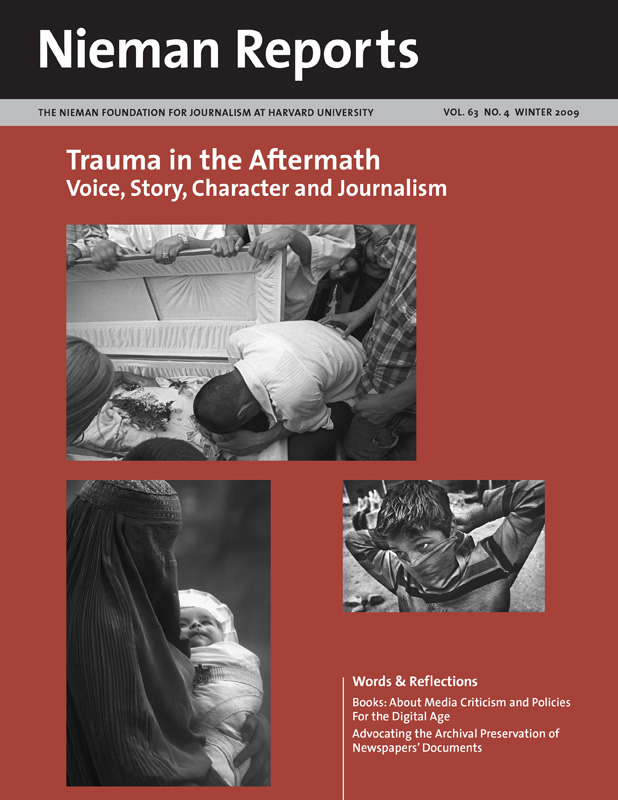
The smell of open sewers hung thickly in the air. A makeshift tent of palm leaves, asbestos sheets, and a checked blue sarong stood bravely, defiantly even, on this ravaged soil—ravaged first by the tsunami, then by Tamil Tiger terrorists, and finally by angry aerial fire from the Sri Lankan Army. A tiny face peered out from behind the sarong wall. Framed in brown curls, it broke into a thousand smiles. My eyes stung for a moment. She was so little. The politics of war were so great.
I wrote these stories. The story about the Sri Lankan Army’s costly military victory over the Tamil Tigers in August 2007. Of 17 aid workers from Action Contre la Faim, the French food agency, lined up and gunned down, their murderers never found in a morass of state sponsored independent inquiries. Of a region struggling to regain its economic strength. The story of fishermen whose livelihoods have crumbled due to unreasonable fishing rules. And the story of that little girl who like a pink lotus in a brackish pond had given this jaded journalist hope.
I wrote stories. That is what we do as we attempt to hold up a mirror in which those accorded the public’s trust may see themselves stripped of veneer. And when we succeed in laying one brick on the path toward a better world we have done our duty well.
We are trained to see through a dispassionate lens. It helps to dull the pain though it can’t dull the outrage that comes from witnessing unbridled corruption that has left thousands of women and children living in makeshift camps, yet to benefit from tsunami funds. It doesn’t blunt the memory of the face of a child orphaned by war. We coarsen our skins and harden our resolve. We act blasé to tell a horrific story.
When a Journalist Is Murdered
So what happens when the pain is so visceral it tears your life apart? What happens when the murderers who are at the doorsteps of those you seek to champion are now at your own? What to do with the pain now?
It was 8 o’clock on Thursday morning, January 8, 2009, two months to the day after I married Lasantha Wickrematunge. He and I were longtime investigative journalists and editors for the Sunday Leader newspaper, which Lasantha founded. We had been united by our work and now we were united in life. Nothing could shake our confidence. We felt strong. Rock like.
January 8th was just another day. That morning Lasantha and I had hurried to the local pharmacy to buy medicine for a domestic aide who was ill. Soon after, Lasantha received a tip-off from our newsroom that he was being followed. We hadn’t noticed anything. But as we returned home, two men on a black motorcycle sped past. They wore helmets and black fatigues and stared us down as we got out of the car.
Lasantha wanted to talk with them. He even walked toward them but I hurried him into the house and locked the door. It was a disturbing moment but not an unusual one. Over the years, he’d been followed, threatened, attacked with clubs, and nearly arrested for what he wrote. Our presses had twice been burned.
I begged Lasantha to stay home that day, but on Thursdays he was always in a hurry. It was the day he wrote his influential political column, Suranimala. Meanwhile, the motorcyclists had vanished and Lasantha felt confident he could handle any lingering threat. He was determined to go to work. He was used to this, was he not?
He drove to the newsroom during rush hour. As he slowed down in traffic, his car was ambushed in a commando-style operation by eight men on four motorcycles, according to witnesses. The windshield was shattered and Lasantha suffered a fatal blow to his head. The attack happened in a high security zone, five minutes from our newspaper and just yards from one of Sri Lanka’s largest Air Force bases.
Back home I got ready to leave for the newsroom. Even though I had begged Lasantha to stay, I took comfort in his confidence and invincibility and felt emboldened.
A half-hour later I got the call. You know the one. The call army spouses dread. The one spouses of journalists in Sri Lanka fear. [According to the Committee to Protect Journalists, 15 journalists have been murdered in Sri Lanka since 2005.]
I didn’t believe what the caller was telling me.
I tried to call Lasantha. My fingers slid over my mobile phone buttons, in hope and silent prayer. Surely my heart had stopped. Damn it, nothing was working. I hate this phone, who gave it to me … oh he did … I must tell him it doesn’t work. I pressed the wrong buttons … on the screen appeared a text message Lasantha had sent a day earlier: “Wifey I love you.”
Every morning, Lasantha would read the 91st Psalm. “… You will not fear the terror of night, nor the arrow that flies by day, nor the pestilence that stalks in the darkness, nor the plague that destroys at midday. …”
More coverage of Lasantha's death, including testimonials from other staffers, is avilable on The Sunday Leader Web site.Inspired by his faith, Lasantha created his motto, “unbowed and unafraid.” It was a sentiment reflected in an editorial he wrote that predicted his own death: “… there is a calling that is yet above high office, fame, lucre and security. It is the call of conscience,” he had stated. The editorial was discovered and published a few days after his murder.
The Pain of Personal Loss
So how does a journalist deal with trauma? I don’t know. I only know this. When it strikes you personally, when you are afraid to sleep in your own bed, when thugs on motorcycles kill your husband then come back for you, when you are compelled to leave your home and family, your work, your country, and your life as you knew it, that’s when you realize you cannot give up. You have to do more, you have to speak louder, write bolder. And now, it’s personal.
I’m a little wounded but I’m not slain;
I will lay me down for to bleed awhile,
Then I’ll rise and fight with you again.
But to rise and fight again, we have to face the trauma of personal responsibility and the guilt that we live while our comrades lay dead. Guilt that we are free while 300,000 men, women and children of the war are interned still in Sri Lankan concentration camps surrounded by barbed wire, not knowing what tomorrow holds.
We have to face emotions we were taught to dismiss. As mourners wept for Lasantha I felt compelled to comfort them. As hundreds of people streamed into our home to pay their last respects to Lasantha’s remains, I retreated upstairs to my computer from
time to time to edit the newspaper, as I always did in his absence. No emotional choices exist for journalists.
As unknown faces passed through our home that first week I couldn’t help wondering if the four large men in army T-shirts and crew cuts who walked in at two o’clock one morning and lingered near the coffin were my husband’s murderers.
Those close to Lasantha denied knowing him. Some who didn’t know him claimed to be his friend. Now shock emboldened me to go on. Some of my friends and family would no longer ride in the same car with me, fearing they would be collateral damage as I would be the next obvious target.
Our home in Colombo lies abandoned and it’s hard to convince a caretaker or even a friend to check in on our belongings. My cousin fears he’ll be attacked by the government if he is seen at our house. Another relative worries about the infamous white van the government routinely uses for abductions. Superstition has done its bit. Nobody likes to rent or buy the home of tragedy, the home of a couple whose dreams were dashed within two months of their marriage. It’s bad luck.
Now, 10 months later, the running stops and finally I grieve. It was easier when there was too much to think about, when all I had to do was look strong and undefeated for the cameras. I face those feelings today, the loss, hurt and anger. The panic of not seeing familiar faces. The stress of the unknown. The sense of abandonment by the country I love.
Suddenly I am not telling the story. I am living it.
Sonali Samarasinghe Wickrematunge, a 2010 Nieman Fellow, is an investigative reporter and editor. She worked with her late husband, Lasantha Wickrematunge, for more than a decade before fleeing Sri Lanka shortly after he was killed, due to threats to her own life. In November, her work in covering human rights, freedom of expression, and freedom of the press was recognized with an Oxfam Novib/PEN Award.



